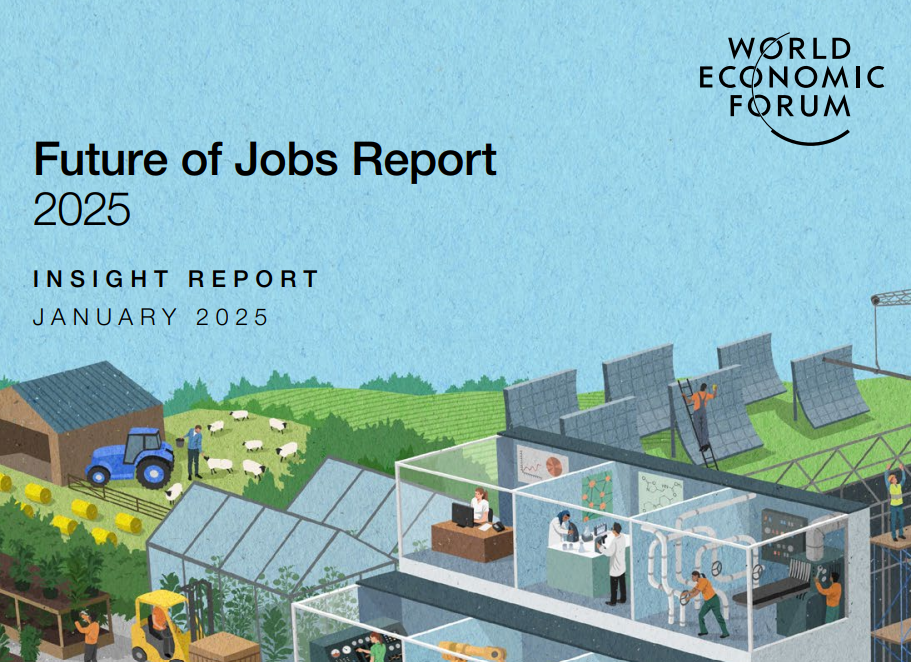Future of Jobs Report 2025

- 12 Jan 2025
In News:
The World Economic Forum's latest "Future of Jobs Report 2025" has highlighted significant trends and predictions for the global labor market by 2030.
Key Highlights:
Fastest Growing Jobs by 2030
The report identified the following jobs as the fastest-growing by 2030:
- Big Data Specialists
- FinTech Engineers
- AI and Machine Learning Specialists
- Software and Applications Developers
- Security Management Specialists
- Data Warehousing Specialists
- Autonomous and Electric Vehicle Specialists
- UI/UX Designers
- Delivery Drivers
- Internet of Things (IoT) Specialists
Job Disruption and Creation
- 22% of jobs globally will be disrupted by 2030 due to automation and technological advancements.
- 170 million new jobs are expected to be created, resulting in a net increase of 78 million jobs.
- Technological shifts, economic uncertainty, and demographic changes are expected to play significant roles in this transformation.
Skills in High Demand
- AI, Big Data, Cybersecurity: Skills related to artificial intelligence and big data are expected to see an 87% rise, while networks and cybersecurity skills are projected to increase by 70%.
- Creative Thinking, Flexibility: Skills like creative thinking, resilience, flexibility, and agility are also expected to see a significant rise, emphasizing the importance of soft skills in a technology-driven world.
Declining Jobs
The report lists the following positions as expected to decline by 2030:
- Postal Service Clerks
- Bank Tellers
- Data Entry Clerks
- Cashiers and Ticket Clerks
- Telemarketers
- Printing Workers
- Accounting and Bookkeeping Clerks
These roles are being replaced or transformed by automation and AI, which are reshaping traditional job functions.
Technological Advancements
- Digital Access: 60% of employers believe that expanding digital access will be the most transformative trend for businesses.
- AI and Robotics: Employers are investing heavily in AI, robotics, and energy technologies, creating a demand for skilled workers in these sectors.
- Energy Technologies: Jobs related to the green transition, including renewable energy and environmental engineering, will see an uptick as countries strive to meet climate goals.
Key Drivers of Change
- Technological Change: AI, machine learning, and automation will continue to reshape industries.
- Geoeconomic Fragmentation: Geopolitical tensions and economic shifts are prompting businesses to transform their models, leading to a greater demand for cybersecurity and security management roles.
- Aging Populations: The growing demand for healthcare services, especially in high-income economies, will result in more jobs in the care economy (e.g., nursing professionals, social workers).
- Green Transition: The global shift toward clean energy and environmental sustainability will create numerous opportunities for jobs in renewable energy and climate change mitigation.
Implications for India
- AI and Robotics Investment: Indian companies are leading the way in investing in AI, robotics, and autonomous systems.
- Growth Sectors: India’s rapidly developing tech sector will see a rising demand for AI, machine learning, and big data specialists.
- Disruptions in Traditional Jobs: Roles like postal clerks, cashiers, and data entry clerks in India are also expected to face significant reductions due to automation.
Challenges for Employment in India
- Skill Mismatch: There is a significant skill gap, with many workers lacking expertise in emerging fields like AI, cybersecurity, and data science.
- Digital Divide: Urban areas are adapting to new technologies faster than rural areas, which may widen employment disparities.
- Informal Sector: India’s large informal workforce faces challenges in transitioning to technology-driven jobs due to limited access to training and education.
Reskilling and Upskilling
- The WEF report emphasizes that 59% of the global workforce will need reskilling or upskilling by 2030 to remain competitive.
- Workers must adapt to new roles, especially in technology and the green transition, to meet the evolving demands of the job market.
